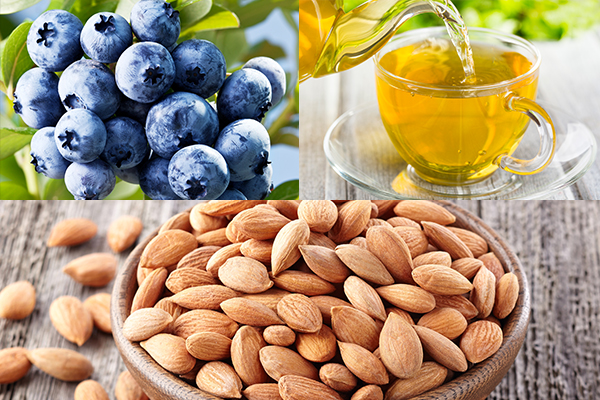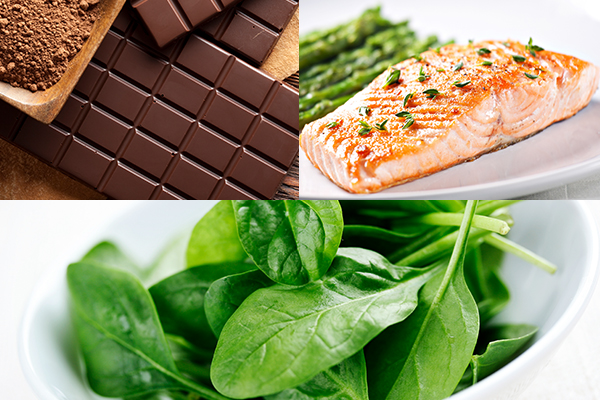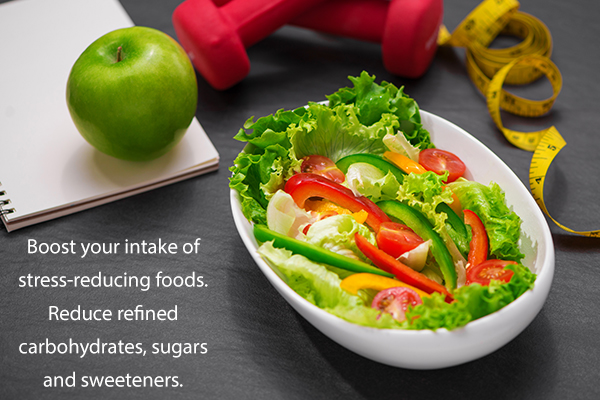In this article:
Everybody has daily stress initiators, for example, receiving bad news, being late for work, or being stuck in traffic. In any of these events, unknowingly through the combination of the nervous and hormonal systems, the body has a surge of hormone release.

Cortisol, also known as a stress hormone, increases the sugar level in your bloodstream, while adrenaline elevates your heart rate and blood pressure.
According to the National Institute of Health (NIH), stress is your body’s reaction to dangerous conditions, whether actual or imaginary. (1) The adrenaline and cortisol levels only normalize once the perceived event is over.
You can’t always control the events that happen to you, but slowly and through lifestyle modifications, you can learn how to battle life stressors.
Best Foods to Fight Stress
What and how much you consume have a significant impact on your mood and emotions. (2) Fighting stress with food is a simple step you can take to manage your health.
Some foods with stress-busting capacities are:
1. Blueberries
Blueberries contain high amounts of flavonoids, which have antioxidant and anti-inflammatory properties. (3) In general, these popular superfoods have high fiber, vitamin C, and vitamin K content while being low in calories.
2. Green tea
In recent years, the popularity of green tea has been credited to its flavorful taste and various health benefits. According to research, theanine, the amino acid found naturally in green tea, has been shown to improve cognition, (4)(5) emotional status, and sleep quality. (6)
If you are overwhelmed with stress and drink too much coffee, you might be better off switching to green tea.

3. Almonds
Almonds are excellent sources of B vitamins, magnesium, vitamin E, and zinc.
B vitamins and magnesium help in the production of serotonin, which is known as a “happiness molecule,” contributing to your happiness and well-being. The antioxidant vitamin E helps prevent oxidative stress from affecting the cells.
4. Dark chocolate
Treat yourself to some dark chocolate if you are looking for a healthy snack to reduce stress.
Moderate consumption of dark chocolate has shown positive impacts on stress management. The polyphenols found in chocolate have been shown to lower stress levels in both stressed and unstressed individuals. (7)
However, avoid overconsumption of this high-calorie treat to prevent unwanted weight gain. Also, aim for dark chocolate with at least 70% cacao for optimal results.
5. Salmon
Rich in healthy fats, protein, several B vitamins, potassium, and selenium, salmon is found to be highly beneficial to your health.
A growing number of researches suggest that consuming this delicious fatty fish regularly can help improve brain function. (8)
Research at Ohio State University demonstrated that consumption of 12–15 ounces of salmon (about 2.5 grams of omega-3 fatty acids) could help reduce stress and anxiety by 20%. The omega-3 fatty acids found in salmons may help prevent the surge of stress hormones. (9)

6. Spinach
Green leafy vegetables are known to be essentials to health. Magnesium, an important mineral found in spinach, can help fight fatigue and headaches, which are compound effects of stress.
It can also help regulate cortisol levels. Moreover, the flavonoids and folic acid in spinach exert antidepressive properties.
7. Avocados
Stress and anxiety may be rooted in a vitamin B deficiency. Avocados are rich in B vitamins and heart-healthy fat that may help in managing stress levels. Avocados also contain folate, which helps in the production of dopamine, or the “feel-good hormone.”
8. Brown rice
Brown rice is an excellent source of B vitamins that aid in the optimum functioning of cells, tissues, and organs.
Moreover, they help improve molecular relations in brain function, immunity, red blood cell health, and cardiac health. B vitamins are also considered to be natural mood stabilizers.
9. Oranges
Rich in vitamin C, oranges can boost your immunity and provide a variety of nutrients to the body, including vitamins A and B and other minerals.
In addition, the vitamin C content of oranges can help neutralize the increased concentration of free radicals in the body produced due to stress.

10. Milk
Milk is loaded with nutrients such as calcium, protein, vitamins A and D, and antioxidant agents. Therefore, having a glass of milk not only strengthens you from within but also helps your body fight the stress-produced free radicals in the body.
Lifestyle Changes to Decrease the Effects of Stress
Stress is common to everybody, but how you handle it determines its impact on your body. The following are some lifestyle tips to manage and prevent stress better:

1. Monitor your diet
Boost your intake of stress-reducing foods. Reduce refined carbohydrates, including white flour, bread, and rice, in your diet; these foods can cause fluctuations in your blood sugar levels, mood, and energy as well.
Similarly, sugars and sweeteners should be limited as they may give a short-lived boost to the mood, but you may end up with low energy and mood a few hours later.
2. Exercise regularly
Aerobic exercises boost oxygen circulation. It also helps pump endorphins, the brain’s feel-good neurotransmitter, thereby reducing stress.
3. Get enough sleep
Set a sleep schedule and get proper rest, up to 8 hours of sleep every night. A well-rested mind and body can handle and face stressful situations better.
4. Watch your caffeine intake
Pay attention to your body’s reaction to caffeine and limit its consumption accordingly.
5. Limit alcohol
Alcohol might have instant calming effects at first, but it can increase stress levels if consumed long term. One drink each day for females and two each day for men are the suggested serving sizes.
6. Take time for yourself
It is helpful to give time for hobbies and activities that can improve your mood, such as listening to music, watching a movie, or reading a book. Performing activities that you enjoy can play an effective role in dealing with stress.
7. Meditate
Meditation is a common stress-management technique that improves your condition by enabling and helping the body and mind to sort out its thoughts, prioritize activities, and work through emotions.
8. Have regular, scheduled meals
It is important not to skip meals if you want to reduce your stress. Having regular, scheduled meals (3–6 meals per day) can help keep your blood sugar in balance. Stress hormones in the body can be a major barrier to the effectiveness of glucose control.
How Does Stress Affect the Body’s Mental and Physical Health?

At times, short-term stress can motivate you, but if you don’t handle it properly, it can stick around for long, resulting in destructive effects on both physical and mental health. These destructive symptoms can range from being vague to severe medical conditions.
Some common physical effects of long-term stress include pain, tense muscle, insomnia, and low energy. Many times, the mental effects of prolonged stress are underestimated, which can include depression, anxiety, racing thoughts, and a change in appetite.
Final Word
Stress is common in everyone’s lives. However, chronic, persistent stress can widely affect your physical and mental health. In such a case, it is vital to be mindful of your stressors and take steps to minimize them.
Additionally, you must lead a healthy lifestyle, such as improving your diet, getting plenty of sleep, limiting alcohol intake, and partaking in activities that bring you happiness, to help reduce your stress.
When your stress and associated symptoms are interfering with your daily activities or are overwhelming, consulting a doctor is highly recommended.
- Was this article helpful?
- YES, THANKS!NOT REALLY


